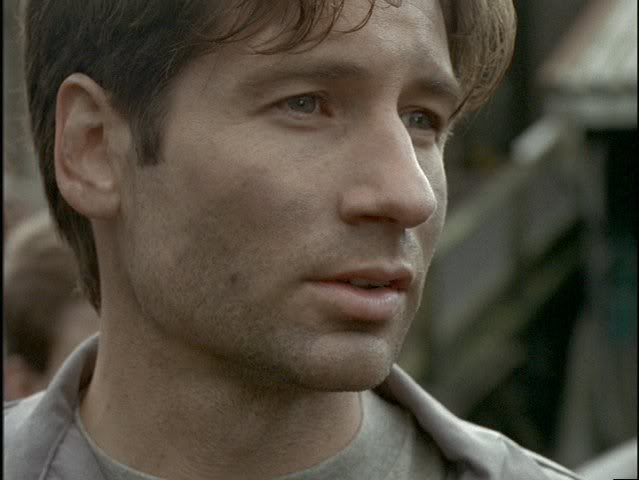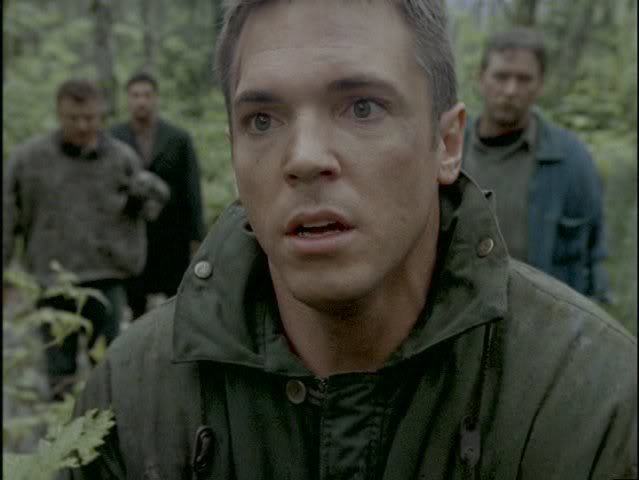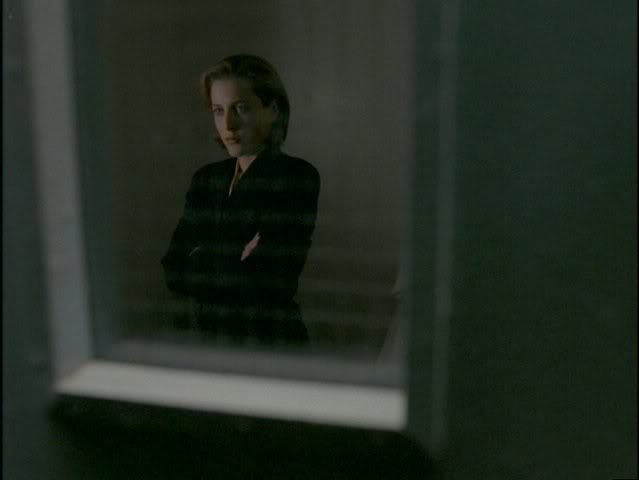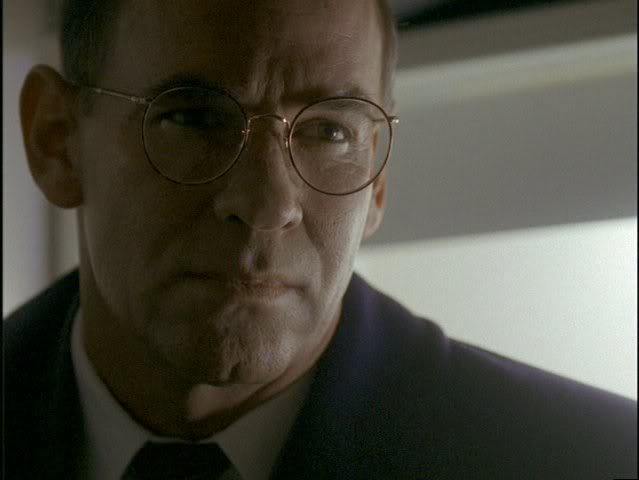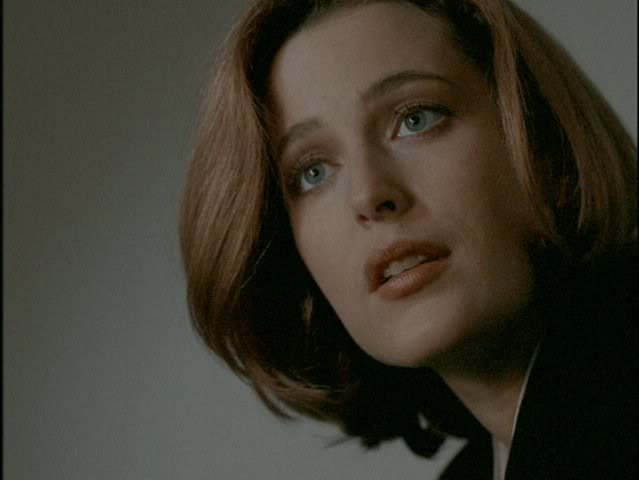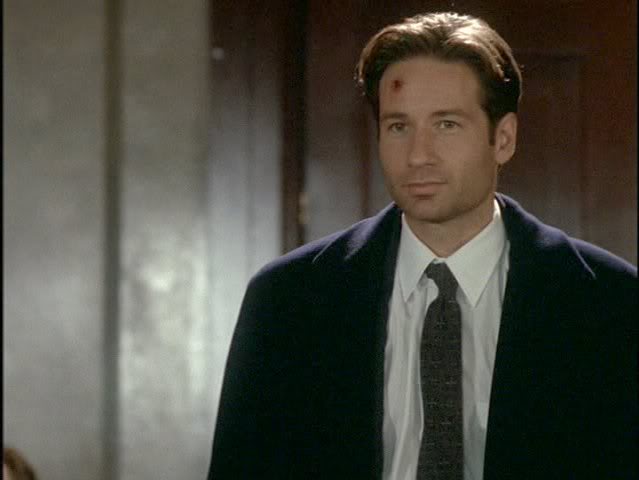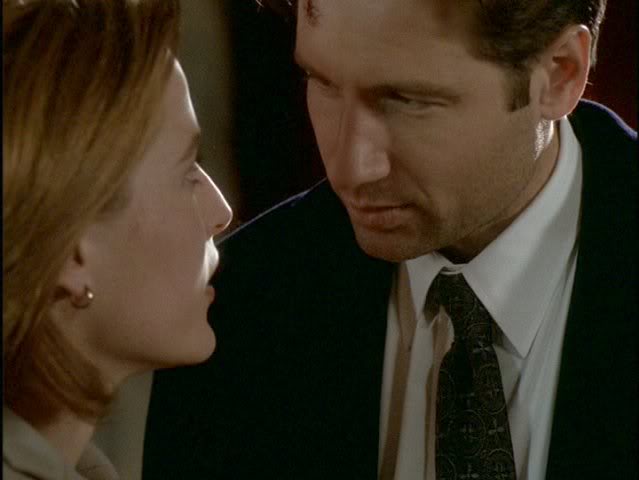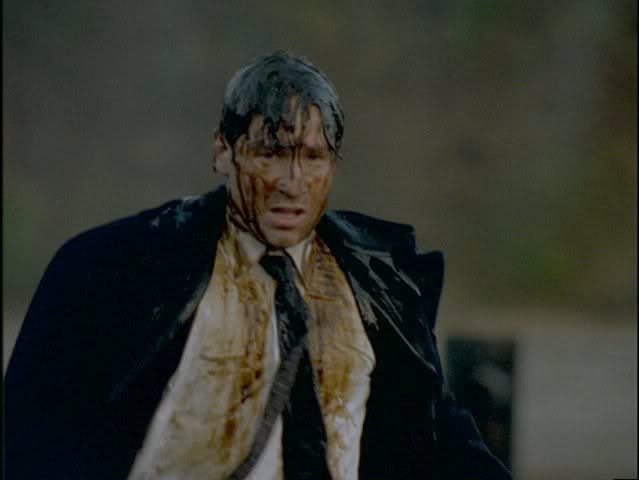REPOST - CTP Episode of the Day - 04.21.06 – Terma
Today's Cherished Episode: Terma (4x10)
Original Air Date: December 1, 1996
Written By: Frank Spotnitz & Chris Carter
Directed By: Rob BowmanStranded in the gulag, Mulder discovers the effects of the alien toxin -- firsthand. In Washington, Scully battles a corrupt U.S. senator to keep their investigation alive.
"I get to put my arms around you. Both of them."
-- "Terma" (or Tyurma) is Russian for prison or jail, also a Latin conjunction of "death." "Terma" is also a Tibetan Buddhist term meaning hidden or buried truth, or buried tablet as referred to in the Tibetan Book of the Dead. In the episode, Terma is a fictitious town in North Dakota.
-- Tag Line Change: "E Pur Si Muove" is Italian for "Still it moves," a phrase attributed to Galileo as he defiantly refuted the Inquisition, which forced him to recant his theory that the Earth revolved around the sun -- meaning that no matter what someone makes you say, it doesn't change what you know to be true. The phrase also evoked the movement of the "black cancer" within the episode.
-- The "honorable men" lines quoted by the Well Manicured Man were almost directly quoted from Shakespeare's "Julius Caesar." The "honorable men" spoken about in "Julius Caesar" conspired against and killed Caesar, so they weren't really too honorable. Apparently, we can assume the same thing about the men whom the Well-Manicured Man was referring to.
-- The bulk of the Russian scenes (the prison camp and the Siberian forest) were shot in Stanley Park, adjacent to downtown Vancouver, and the Seymour Demonstration Forest, just a short drive north of the city. "We chose our camera angles carefully and trucked in a lot of mud," said locations manager Todd Pittston. "It was pretty straightforward, actually, but it worked well and looked really great."
-- "We spent a lot of time shooting outdoors," Nic Lea remembered. "You know, those scenes with the horses and everything? It was so much fun. Again, you felt like your life was a little bit in danger, but thrilling."
-- To get that extra frisson of verisimilitude, production designer Graeme Murray -- whose chilling chicken-wire restraints in the fiscal scene of "Tunguska" was only vaguely hinted at in the original script -- directed that real rocks, not fake prop ones, were to be used in the prison camp mining scenes. Art director Gary Allen went to a nearby quarry, picked out boulders in a pouring rain, and had them delivered by forklift to the location.
-- "The prison was one of the episode's big sets," recalled director Rob Bowman. "Making a prison look like it was in Russia when it was basically a ranger's station in the middle of Stanley Park, just a couple of trees away from downtown Vancouver. We brought in, I think, 50 or 60 truckloads of dirt. You just create the atmosphere of being far away, and you put a title under there. It says, 'Tunguska, Russia.' You try to make sure you don't give the viewer more reasons to disbelieve it than to believe it. You got the Russians, you got the horses, you got the prison, you got all the stuff. What's in the shot that could spoil it -- remove those things!"
-- A considerable number of horses and their handlers were needed for "Tunguska" and "Terma"; the animals and their handlers were employed not only in the make-believe tundra forest but at a rented horse farm in South Surrey that served as the Well-Manicured Man's home base.
-- A requirement of the episode was that Alex Krycek speak Russian with the proper syntax and accent, so a Russian-speaking dialogue coach was hired to work with Nic Lea during filming.
-- Looking back on "Terma," Nicholas Lea wished he had taken the scene where rebels sawed off Krycek's left arm to the edge. "I always look back on that and think I should have been jerked by the movement of the guy cutting my arm, and I didn't. That's one thing I regret about that."
-- The U.S. Senate hearing room was actually an elaborate set constructed on North Shore Studio's Stage One.
-- For her part, Gillian Anderson recalled with pride the way her character stood up to the congressional committee -- and the realistic strength with which she played those scenes. She also, she said, had a sort of semi-mystical experience during the late-night filming of the scenes in which she, as Scully, was sitting in jail for contempt. "I don't know exactly what it was," said Anderson. "I just remember working on that scene and feeling some aspects of Scully that I hadn't felt before or after. I don't know if that actually came across, but it was just, well, different. I remember walking away feeling very odd."
-- The climatic oil refinery scenes were shot at what was actually a thermal energy plant, near Port Moody, B.C. Rainy weather plagued the production during the filming of the sequences, but the spectacular set-piece scene -- the explosion and fire at the oil wellhead -- went off perfectly. "At first they wanted to blow up the entire refinery," recalled special effects supervisor David Gauthier, "but I told them it would be very difficult and there would be a huge bill. Then I suggested: 'Why not do the oil fires of Kuwait?'"
-- Gauthier and his crew rigged their dummy wellhead with pipes and nozzles and then used a high velocity pump to spew 35,000 gallons of oil-colored water into the air. The same wellhead was equipped to shoot a mixture of burning kerosene and gasoline, and when the time was right, 2,000 gallons of liquid propane pressurized to 250 psi. "We had a remote control valve," said Gauthier, "so we could switch from one nozzle to another. So we essentially switched from liquid oil to burning oil, blew up the van directly in front of the oil well, and away we went."
-- Comrade Arntzen, Krycek's alias, was named for Val Arntzen of the set decorating department.
-- Jan Rubes (pronounced Yan RU-bish) was one of Canada's best known performers. A refugee from communist Czechoslovakia, he had starred in major films like Witness and was an internationally known opera singer who for many years hosted his own music program on CBC Radio.
-- Both Mulder and Scully were imprisoned in this episode, but Scully got a nice, bright, white, clean cell and Mulder got the dirty, dark dungeon-like chamber.
-- Fashion faux pas: Scully wore black shoes with her tan outfit.
-- Jim Gross was nominated for a 1996-97 Emmy Award for Outstanding Single Camera Picture Editing for a Series for "Terma."
-- In observing how the two directors of "Tunguska/Terma" approached what was in essence two halves of a single script, David Duchovny said, "I think Kim was very attuned to the emotion of the relationship between Mulder and Scully. And Rob, I believe, was very much attuned to the action-flick action sense of the show."
-- X-Files producers described "Tunguska" and "Terma" as two of the most expensive, complicated, and stubbornly trouble-plagued X-Files episodes ever filmed.
-- Once & Future Retreads: Robin Mossley (Dr. Kingsley Looker) was Dr. Joe Ridley in "Young at Heart" and Dr. Vance Randolph in "Our Town." Campbell Lane (Committee Chairman) was Hohman's Father in "Miracle Man" and Calsuari #3 in "The Calusari. Brenda McDonald (Auntie Janet) was Mrs. Loach in "Folie a Deux." Eileen Pedde (Angie) was Mrs. Skur in "Travelers." Brent Stait (Timothy Mayhew) was Corporal Taylor in "Fallen Angel." Malcolm Stewart (Dr. Sacks) was Dr. Glass in the "Pilot," Commander Carter in "3," and Agent Bonnecaze in "Avatar." Igor Morozov (Russian Horseman) was Pudovkin in "Never Again." Raoul Ganeev (Russian Guard) was Dmitri in "The Host" and a Guard in "Patient X." Vitaly Kravchenko (Russian Truck Driver) was J.J. in "The Post-Modern Prometheus." Anatol Rezmeritza (Glasses Man) was a Commandant in "Patient X."
(Thanks to chrisnu for today's pics.)
Please share your first impressions, favorite (or cringe-worthy) moments, classic lines, favorite fanfic, nagging questions, repeated viewing observations, etc., as today we celebrate "Terma"!
Polly
